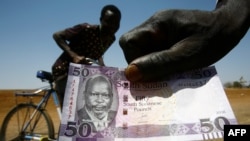South Sudan's central bank took steps Wednesday to bolster the economy amid the COVID-19 lockdown, but an analyst warned the economy will only improve after the government restores peace and security.
The COVID-19 disease is caused by the coronavirus.
The central bank lowered interest rates from 13% to 10% and lowered the cash reserve ratio from 15% to 10% to reduce economic hardships on individuals and businesses during the pandemic. The cash reserve ratio is the minimum fraction of total deposits from customers that commercial banks must hold in either cash or deposits.
The measures are meant to reduce the overall cost of financing for the private sector and release additional cash to commercial banks, which should help spur economic activity during the COVID-19 pandemic, according to Bank of South Sudan Governor Gamal Abdalla Wani.
“The Bank of South Sudan deemed it necessary to suspend circular No. SDR/S/4/2020 that directs all banks to raise their paid capital to a minimum of five billion South Sudanese pounds for a period of six months. This measure is taken to protect the financial sector and prevent [the] potential risk of a banking crisis,” Wani told South Sudan in Focus.
Bank buys crude gold
One of the measures adopted by the bank in March when the pandemic hit the country was the purchase of crude gold. The bank has been exploring efforts to refine the gold, said Wani.
The government has allocated $5.5 million to support the new measures and if they work, Wani said, the inflation rate should stabilize over the next two years, enabling the government to inject more hard currency into the economy.
“The prices of oil really went down so much that it is not really earning us enough foreign currencies for the nation to be able do whatever they want to do,” Wani told VOA.
Virus hurts imports
The COVID-19 lockdown has dealt a serious blow to the flow of imported goods into South Sudan, Wani added.
“It has restricted us in a way that we can’t move as we used to do. Nearly all the countries in the world, they closed their air space. No more transportation by air, by railway, by cars, even going to our neighbors here. So that means if we are depending on some goods, we are a landlocked country, we are affected most,” Wani told VOA.
Professor Ahmed Morjan, a lecturer of economics at the University of Juba, welcomed the new measures, saying they should boost domestic production; but, he warned one major obstacle stands in the way of the country’s economic improvement.
“When there’s insecurity, there is no political stability, then all these may not work. This one must be associated with peace and security in all these areas, because most of the agricultural activities take place in the rural areas and if people in the rural areas are not secure, then all these projects may not work,” Morjan told South Sudan in Focus.
According to the International Monetary Fund, the global economy was projected to shrink by 4.9% in 2020 due to the COVID-19 pandemic.
Investment in agriculture needed
The government must diversify South Sudan’s economy by strengthening investment in agriculture so when oil prices drop even further, the rest of the economy will not fall apart, said Morjan.
Civil war broke out in South Sudan in 2013 when President Salva Kiir fell out with his then-vice president Riek Machar, accusing the opposition leader of trying to stage a coup. Hundreds of thousands of South Sudanese were killed and millions more displaced. A fragile, revitalized peace deal was signed this past February, but deadly inter-communal fighting in parts of the country in recent months has threatened to tear apart the agreement.







